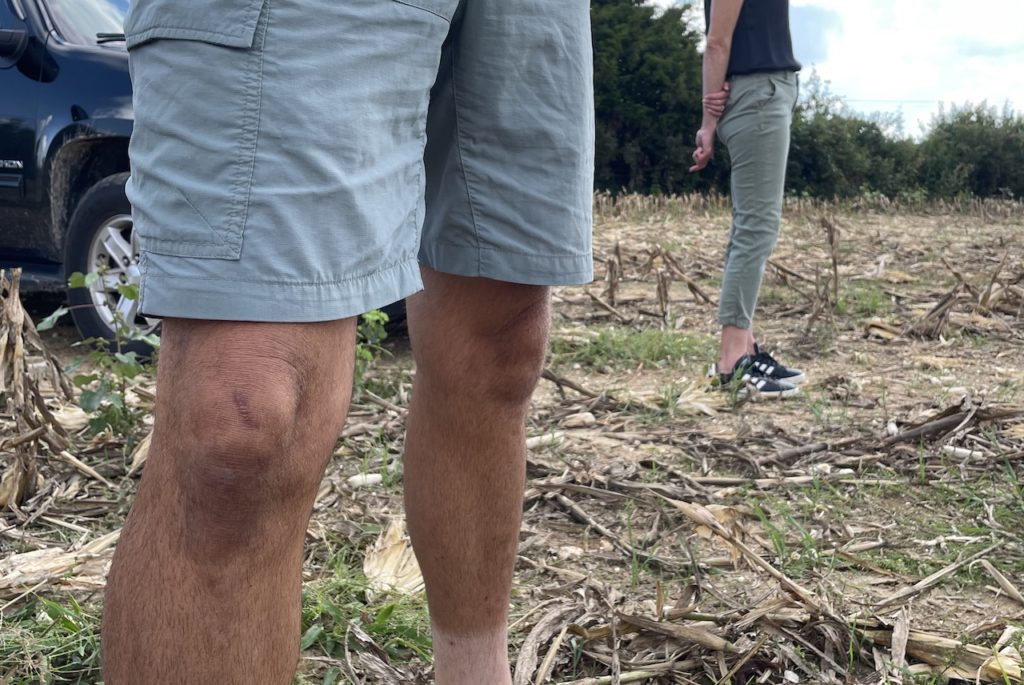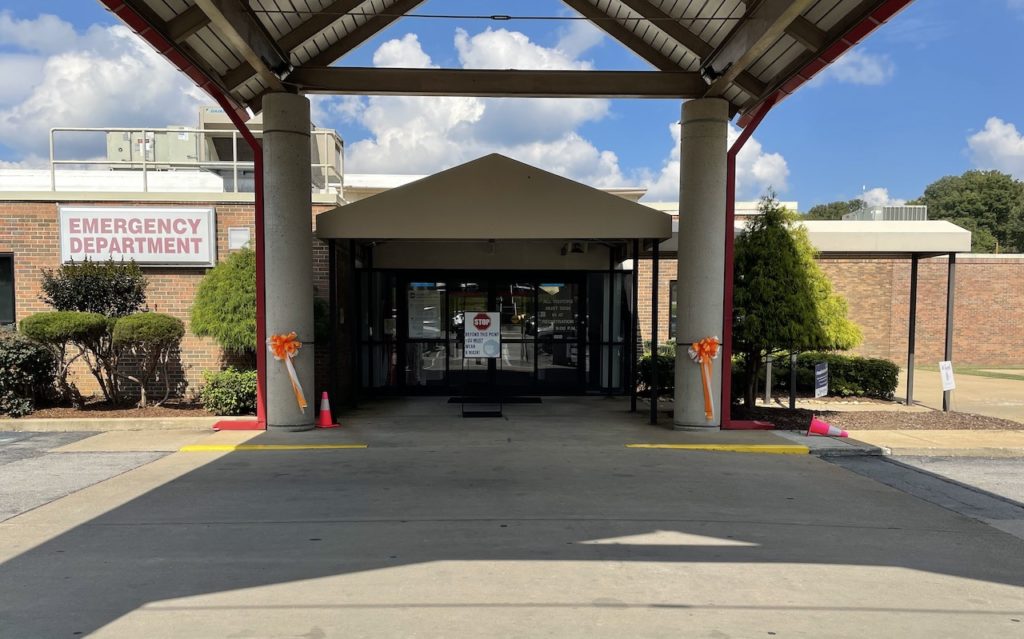
Some guys brag about scars, but not this one.
“This little scar on my knee — that’s $6,500, that little one-inch thing right there,” Jason Dean says, lifting his leg for closer inspection. “Isn’t that amazing? That kept her from actually seeking normal medical care.”
Jason and DeeAnn Dean recently relocated to her hometown of Dellrose, Tenn., where she grew up cultivating a couple thousand acres. They’re in their late 40s, trying to start organic farming and get more people growing their own food in this fertile farm country.
They’re still seeing if there’s an appetite for this sort of grow-your-own business, so they’ll pick the occasional truckload of corn to sell on the roadside.
Jason is also working construction at the moment. And in May, there was a little incident on the job site.
 Blake Farmer WPLN News
Blake Farmer WPLN NewsOn Jason’s bill from the hospital, the cut is listed as “simple 2.5 cm.”
The cut
A piece of sheet metal slipped and caught him on the knee cap. It bled. Quite a bit. He closed it up with a butterfly bandage. But on his drive home, he figured it’d be best to have it stitched up.
Urgent care in Pulaski was closed, leaving only the emergency department at Southern Tennessee Regional Health System. He and DeeAnn have a less-expensive health plan with an $8,000 deductible, since they’re in generally good health and rarely need a doctor. So he knew it wouldn’t be cheap.
But he figured the peace of mind is worth it.
“Every time they said, ‘Your insurance will cover this. … Your insurance will cover this.’ And I had to take them at their word,” he says. “Because I’m not versed in medical billing or medical law. So I said, ‘Let’s go ahead and stitch it up.’ ”
It took 30 minutes, he says, in and out. No one ever told him an amount. He guessed no more than $1,000 — expensive, but the risk anyone with a high deductible takes.
Then a few weeks later, he begins receiving bills totaling more than $6,000. And he’s being asked to pay more than $4,000 of it.
“Six stitches was more than a month’s salary for the overwhelming majority of Americans. Think about that,” he says, having pondered his predicament for weeks.
Pushing back
The Deans spend hours on the phone, asking the hospital and the physician’s group to review the charges. And they’re both sticking by the original bills.
The hospital is owned by Brentwood-based LifePoint Health. The ER physicians are part of TeamHealth based in Knoxville. Both are companies owned by private equity investors. And both tell WPLN News, essentially, the charges are what they are.
A TeamHealth spokesman says their records show that Jason needed extra infection prevention, like a tetanus shot, though that’s fairly standard for cuts that require stitches. He also blames health plans for selling high-deductible plans.
“Unfortunately, it is all too common that patients are not knowledgeable about their financial responsibilities under high-deductible plans,” spokesman Greg Blair says in a written statement from the company.
But investigative journalist Marshall Allen, who is the author of a new book called “Never Pay the First Bill,” says the health plan is irrelevant in this case.
“It’s not like we just need better insurance coverage to cover these high costs,” he says. “What we need to do is to say there is no justifiable reason for these high prices.”
And the scary thing is that for one in 10 Americans, according to a Kaiser Family Foundation survey, it ends up leading to putting off necessary care.
‘I’m going to need more than six stitches’
That’s what happened to DeeAnn. In August, she started feeling as bad as she’s ever felt.
“I haven’t eaten. I’m not drinking. I have a horrible fever. I can’t get out of bed. I’m shaking,” she says.
She was pretty sure this must be COVID. She was kicking herself for putting off the vaccine. She went to get tested, but it was negative.
So the urgent clinic also took a urine sample. She sheepishly handed the nurse a very brown cup.
“I know this is not healthy. I know this isn’t good,” she said. The nurse responded that she needed to go to the emergency room.
But DeeAnn refused to go back to the nearby ER in Pulaski.
 Blake Farmer WPLN News
Blake Farmer WPLN NewsThe Pulaski hospital is part of the Southern Tennessee Regional Health System, owned by Brentwood-based LifePoint.
“That’s not just stubbornness. That is fear,” she says. “If they charged Jason this much, what would they charge me? Because I’m going to need more than six stitches.”
She drove south to Huntsville and tried another ER. But it was so full of COVID patients, she would have had to wait all day. And she was deliriously ill. And something weird has started going on with her hearing.
So her parents drove her north nearly an hour to Maury Regional, a public hospital in Columbia.
They ran a bunch of tests and diagnosed her with Rocky Mountain spotted fever, likely from a tick bite she got while in the cornfields. The tick-borne illness is easily treated with powerful antibiotics but can be deadly.
“Had I not gone to the ER when I did, I would have had organ damage or possibly death in a few days,” she says. “That’s scary.”
She was still worried about the Maury Regional bill, especially after her battery of tests and being hooked to IV fluids. But even after all the care and the same high-deductible plan as her husband, she’s only out $600 — an amount she says she will gladly pay.
As for the bill for Jason’s stitches, which they submitted to the Kaiser Health News “Bill of the Month” database, they’re still fighting.

